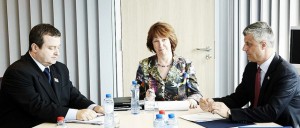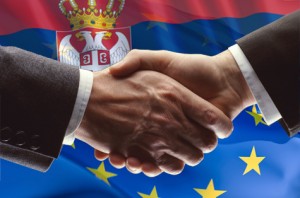Serbia has been seen as corrupt, politically unstable, technologically backward, and filled with ethnic tensions. The violence Serbia has engaged in tainted its reputation and it will remain in infamy as the hostile player in Europe’s only modern wars. The question of Serbia’s accession into the European Union has only previously been verbally considered, but since the turbulent 1990s, Serbia has made considerable progress in order to be considered for EU membership.
The path to European Union membership has been a long and winding road for Serbia, filled with curveballs thrown in from the European community along the way. Since the signing of the Stabilisation and Association Agreement (SAA) in 2008 and the formal application for EU membership in 2009, Serbia has immersed itself in a challenging journey to join the club of ‘westernised’ states – such as their former compatriots, Slovenia. The EU has requested for Serbia’s cooperation with the extradition of its war criminals, reforms in the political arena as well as the revision of its rule of law, and of course, the looming question regarding the status of Kosovo.
The capture of those who committed crimes against humanity during the 1990s such as Ratko Mladic and Goran Hadzic would secure Serbia’s wedge in the door for membership. A large condition of Serbia’s accession is its adherence to its peace agreements from the Yugoslavian and Kosovar wars, and its compliance with the International Criminal Tribunal for the former Yugoslavia in The Hague. The man hunt for major war criminals stepped up in 2010 – Mladic was arrested first, with Hadzic following closely behind in 2011, receiving praise from the international community which forced the EU to take its consideration of Serbia’s membership more seriously.
From 2009 – 2011 the process for membership had constant lulls. Throughout this period EU member states kept Serbia on edge while they progressively ratified their SAA, presented them with an Interim Trade Agreement and implemented visa-free travel in the European region. By the end of 2011, the European Commission recommended that Serbia become a candidate for membership and for negotiations regarding accession to formally begin – however, constant postponements were made in the meantime until Serbia had made considerable developments.
The Quest at the Present Date
In March 2012, Serbia was confirmed as a candidate for European Union membership. Relations with Kosovo has been the most contentious issue for membership, and a reason why Serbia’s accession would be uncertain. After negotiations kept being postponed during 2011, throughout the most part of 2012 and the start of 2013, Serbia has engaged in constant dialogues with Kosovo over their autonomous status. By the end of the year, the Serbian government had made a drastic de facto recognition that Kosovo was no longer subject to Serbian sovereignty.
April 19th 2013 has been hailed a historic date by media agencies around the world with the signing of the Brussels Agreement between Prime Ministers Ivica Dacic of Serbia, and Hashim Thaci of Kosovo for the normalisation of relations between the two regions. Although Serbia does not recognise Kosovo’s independence, the agreement stipulates that the four Serbian municipalities in Northern Kosovo will be subject to Kosovo law, and local council elections will be held under Kosovo law. Other areas of the agreement include changes in the police force, judiciary, the adjustment of Serbia and Kosovo’s legal frameworks and other general provisions. Both Serbia and Kosovo have also agreed not to block each other’s efforts for EU membership – both wanting a chance to drink from the great grail of Europe.
Since the signing of the Brussels Agreement, Serbia has attempted to frantically implement as many parts of it as it possibly can before the end of June. On June 28th 2013, the European Council will decide whether Serbia has met the appropriate requirements to receive a start date for accession negotiations. This week Serbia will be gritting its teeth for the verdict.

Ivica Dačić, Catherine Ashton and Hashim Thaci Source: B92 News
What Happens When the Knights Open Access to the Round Table?
The European Union safeguards the gateway into its community through a legal framework known as the ‘Copenhagen criteria’. This focuses on a state’s government and economy as the deciding factors for future offers. The political structure of Serbia is particularly concerning for the EU because it demands building an institution which promotes public welfare and rule of law, whereas previous states have been converted into a pluralist democracy without having the dilemma of a broken political system. One of the major weaknesses in Serbia is its legal system and the inability for its citizens to gain access to effective and timely justice. The workload of judges and the length of the proceedings are excessive, with a problem of unequal distribution of cases as well as a growing number of unresolved cases which remain – some that even date back to the 1970s. The Serbian public do not have equal access to justice and many go outside the country in order for their cases to be completed. In terms of corruption, there is still a large hurdle for Serbia to get over with bribery and law and organised crime, but at this stage it is at an acceptable level of control for membership.
In regards to Kosovo, the implementation of the Brussels Agreement will need to be executed. Each point of reform such as community, police and municipal elections have set goals which need to be met by May, June, October or the end of 2013. Serbia will need to continue cooperating with EULEX (European Union Rule of Law Mission in Kosovo) and work on its cadastral system with Kosovo to ensure support for rule of law reform, economic development and resolution of disputes. Serbia will also need to strengthen and maintain its relationships with states in the region. Specific attention is concerned with countries in the former Yugoslavia, Bulgaria, Romania, Hungary and Turkey. Many high-level visits have taken place between Serbia and these states, and currently, it has demonstrated a positive commitment to the region, satisfactory to the EU’s conditions.
So far Serbia has reaped some benefits that have come with this battlefield of bickering such as the Interim Trade Agreement and visa-free travel in areas of Europe, but it is still tagging well behind its adversaries such as Croatia. Serbia has advanced its status while attempting to enter this exclusive club, and will continue to reform and make considerable progress in the coming years. Membership is uncertain, predictions have been made that Serbia won’t enter the EU until at least 2015, but until then, Serbia still has a lot of work to do if it continues its journey for European Union membership.
Find more articles by Sandra here
 Burma/Myanmar – Building a Sustainable Peace? A Close-Up on Kachin
Burma/Myanmar – Building a Sustainable Peace? A Close-Up on Kachin
Power struggles, a constitution which deepened divisions and stormy rebellions brought Burma into the world in 1948 after its split from the British Empire. Now also known as Myanmar, the …


Trackbacks / Pings